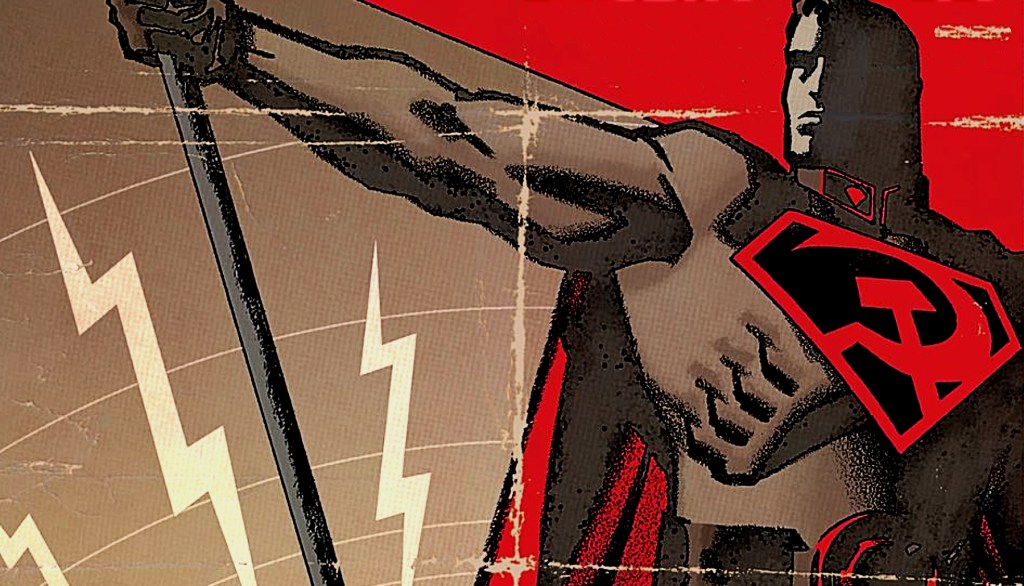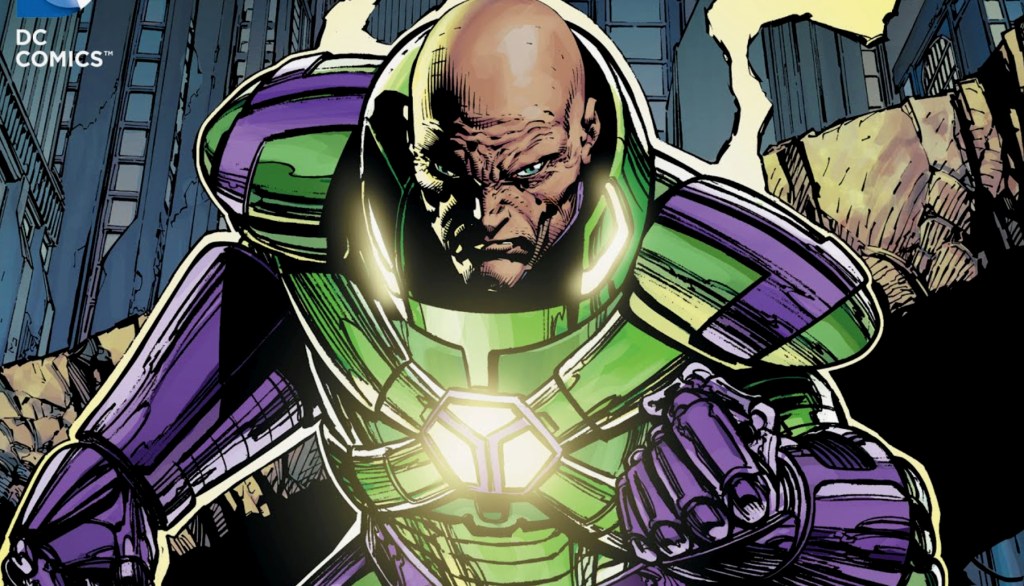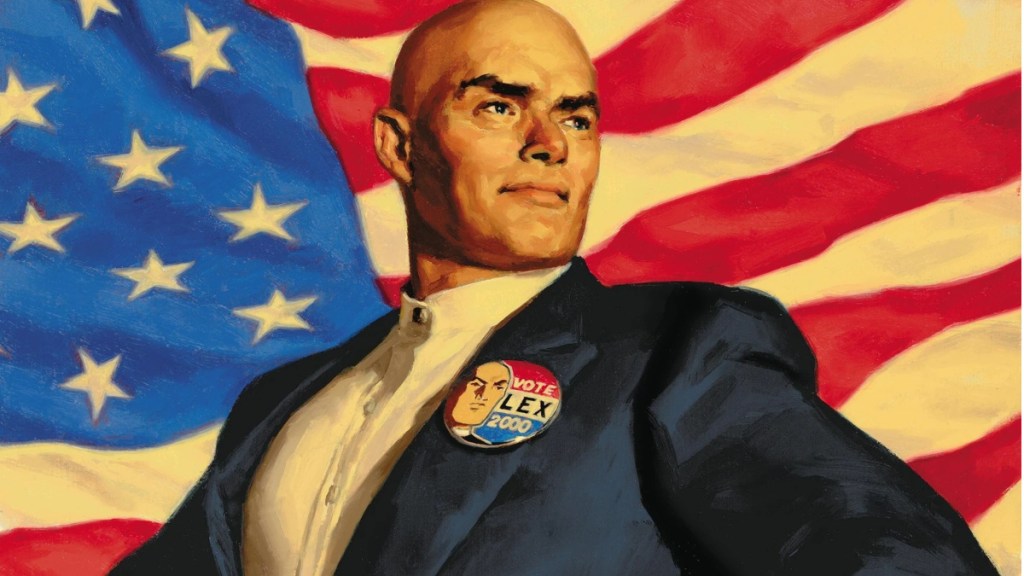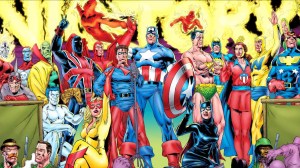One of the painful facts in the life of a DC Comics criminal is that mistakes, miscalculations, and errors in judgment are costly at best, and fatal at worst. While the average thug might think twice, considering the probability of making a mistake before attempting another illegal act, the DC supervillain, never satisfied with what they have, tends to continuously double down on their success until mistakes are made and consequences are suffered. Nowhere is this truer than with Superman’s arch-rival, Lex Luthor. For much of his adult life, Luthor has been trying scheme after scheme to take out the Man of Steel, only to suffer ignominious defeat.
Videos by ComicBook.com
Indeed, as Lex Luthor himself admits in Justice League vs. Godzilla vs. Kong by Brian Buccellato and Christian Duce, the pain and self-loathing that come from making mistakes are real — and at times, even spectacular. However, Luthor is far from being a mere “bot.” He has orchestrated some of the most infamous capers in superhero comic book history. Luthor’s thinking, planning, execution, and mindset have been remarkably precise on more than a few occasions. With that in mind, here’s our list of some of the most memorable times when Lex Luthor was truly “spot on.”
1) Superman is an Alien Menace to Society

One of Luthor’s most fundamental beliefs about Superman is that he is an alien existential threat to humanity. This belief has several elements, including the idea that Superman can become a tyrant under his own volition or, under the influence of others, turn into the ultimate and unstoppable enforcer. Over the decades, Luthor’s point has been proven on more than one occasion. For example, in Frank Miller’s The Dark Knight Returns, Superman is depicted as the government’s unquestioning enforcer of the status quo. Moreover, evidence of Luthor’s belief is not just isolated to DC’s primary reality. In the Elseworlds series Superman: Red Son by Mark Millar and Dave Johnson, the Man of Steel is also “brainwashed” into becoming the ultimate champion of Soviet communism and later a global tyrant with unlimited power.
[ RELATED: DC Teases Titanized Heroes and Villains in Justice League vs. Godzilla vs. Kong 2 First Look ]
Another aspect of Luthor’s hatred for Superman is the belief that humanity’s continued reliance on him stunts our development, progress, and independence as a species. Naturally, coming from someone as diabolical as Luthor, these complaints largely fall on deaf ears. However, in Grant Morrison and Frank Quitely’s All-Star Superman series, when Luthor temporarily gains Superman’s powers, he not only experiences firsthand the immense burdens that come with such abilities but also sees how deeply humanity has come to depend on Superman to solve its most pressing problems. This dependence, he realizes, has made humanity “soft” where it should be strong, and beholden to the whims of an alien.
2) The World is Just One Deviant Superhero Away From The Ultimate Calamity

Drawing from his idea that all-powerful beings like Superman are inherently beyond the reach of the rule of law, Luthor has also contended that the Justice League comprises superheroes equally capable of seizing control of the world should they inevitably go “rogue.” In Luthor’s analysis, global calamity hinges on just one of these heroes experiencing a “breakdown” or succumbing to stress overload. Naturally, this reinforces Luthor’s conviction that he is humanity’s savior, perpetually poised to act and safeguard the world. While this perspective might echo the sentiments of someone with a God complex, is it truly that far-fetched?
In JLA: Tower of Babel by Mark Waid and Howard Porter, Batman becomes the rogue hero. Driven by a deep-seated fear of the superpowered — an idea not unlike Lex Luthor’s — Batman devises contingency plans to neutralize every member of the Justice League, including his own DC Trinity ally, Superman. However, when Ra’s al Ghul steals and executes these plans, the results are catastrophic.
What’s even more shocking than the devastation itself is the revelation that these strategies were crafted by Batman, one of the most trusted pillars of the DC superhero community. This devastating twist unequivocally validates Luthor’s belief that a single rogue superhero could plunge the world into chaos. In other words, it proves his argument that a superpowered individual doesn’t need to be evil to pose a threat — instability alone is far more dangerous.
3) DC Supervillains Cannot be Trusted

Lex Luthor’s general hatred of superpowered beings is not just focused on Superman and the Justice League; he also has a particular disdain for his fellow supervillains. Luthor believes many criminals are too self-centered, impulsive, and narrowly focused to be trusted. In Luthor’s analysis, superheroes, like regular law enforcement agencies, benefit from a system built for their ultimate success – that is, the cards are always stacked against criminals. Consequently, Luthor avoids working with other supervillains unless it serves his goals or helps him, and only him, get what he wants. Absent this, Luthor argues, the future is bleak for the criminals of the world.
Perhaps the most compelling evidence for Luthor’s concept of supervillain trust issues is demonstrated in Geoff Johns and David Finch’s Forever Evil series. In the absence of the Justice League, Luthor is forced to organize and lead a team of criminals against the Crime Syndicate. While some members prove effective, the majority are too focused on their own agendas to be reliable. Moreover, at a crucial point, Deathstroke betrays Luthor and defects to the Crime Syndicate. As Luthor later suggests, if you want something done right, don’t entrust it to a band of criminals. Furthermore, in Brian Azzarello and Lee Bermejo’s Lex Luthor: Man of Steel, Luthor’s elaborate plan to defeat Superman is ultimately wasted when his partner, John Corben—Metallo, becomes too unstable for the plan to work.
4) Batman is Right: The Joker is an Uncontrollable Threat to Peace and Security

As a supervillain, Luthor thrives on the long game — the meticulously planned operation that considers every factor to achieve the most effective outcome. Naturally, this demands discipline: every member of the operation must be aligned and execute their responsibilities exactly as planned or understood beforehand. This is why Luthor views the Joker as both dangerous and useless. In Luthor’s opinion, the Joker’s tendency to act on impulse inevitably leads to chaos and, ultimately, capture by the authorities. But Luther’s opinion is more than that.
Luthor’s point is demonstrated in Elliot S. Maggin and Irv Novick’s The Joker (1976) #7. In the story, Luthor and the Joker accidentally switch personalities. While the Joker finds having a more rational perspective somewhat dull, he recognizes that it increases his effectiveness. Conversely, Luthor despises the Joker’s impulsiveness and tendency to “ad-lib.” Furthermore, while the Joker’s deviant mindset allows him to devise a master plan for world domination, the plan ultimately proves unworkable because the insanity that’s required to pull it off can only come from a mind so unbound that it would be hard for him to operate in a rational world.
5) Lex Luthor Really is a Super-Genius

Never one to shy away from “tooting his own horn,” Lex Luthor eagerly tells anyone willing to listen about his talents, how he became so accomplished, and why he believes he will ultimately save all of humanity. Naturally, it’s easy for those around him to dismiss his boasts for what they usually are—over-the-top claims that few take seriously. After all, we’ve all witnessed the archetypal blowhard whose knack for failing upward seems to underscore the sheer randomness of the world.
Despite a history miscalculations and mistakes, Lex Luthor’s claims of exceptional intelligence hold true in specific areas of scholarly expertise and heroic action. For instance, in Superman #149, while imprisoned and plotting his defeat of Superman, Luthor effortlessly develops a cancer cure. Furthermore, in Jeph Loeb’s Superman: Lex 2000, he achieves the presidency of the United States. These examples illustrate, just as Luthor would eagerly argue, that his remarkable intellect, capable of tackling global issues, warrants consideration in any substantial initiative aimed at protecting the DC Universe. That is, Lex’s brag about being the smartest person in the world – is true.








